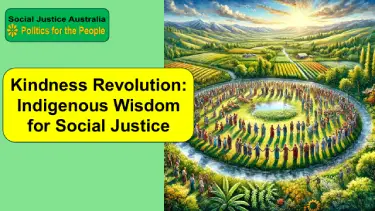Description
Discover the kindness revolution: How Indigenous wisdom on kindness and connection can guide Australia toward a fairer, more compassionate society.
Note: This article has been inspired by comments made and discussions with one of my Facebook members, Stephen Tardrew.
Introduction: A New Path Beyond Blame
Australia is at a crossroads. The nation grapples with growing inequality, environmental degradation, and a fraying social fabric. Decades of neoliberal policies have placed profit and competition above community and well-being. As a result, the most vulnerable have been left behind, and our environment suffers from relentless exploitation. However, there is an alternative—a path inspired by Indigenous wisdom that champions kindness, interconnectedness, and a deep respect for all life.
Imagine a society where kindness and compassion are the guiding principles of governance. For generations, Indigenous Australians have lived by these values, fostering harmony with the land and each other. This article explores how embracing an ethos of kindness, rooted in Indigenous traditions, could transform Australia’s social, environmental, and economic systems. By prioritizing collective well-being over individual gain, we can work toward a society grounded in justice and sustainability.
Understanding Indigenous Wisdom: Kindness, Care, and Responsibility
The Indigenous Perspective on Interconnectedness
 For Indigenous Australians, the concept of interconnectedness is a central tenet of their worldview. The land, or “Country,” is not just a physical space but a living, breathing entity that sustains and is sustained by the people. Every rock, river, and tree hold cultural and spiritual significance, reflecting the idea that all life is part of an intricate web. This holistic perspective underscores the belief that the well-being of one impact the well-being of all.
For Indigenous Australians, the concept of interconnectedness is a central tenet of their worldview. The land, or “Country,” is not just a physical space but a living, breathing entity that sustains and is sustained by the people. Every rock, river, and tree hold cultural and spiritual significance, reflecting the idea that all life is part of an intricate web. This holistic perspective underscores the belief that the well-being of one impact the well-being of all.
Contrast this with the neoliberal worldview, which often treats the Earth as a resource to be exploited for profit. Environmental degradation and resource depletion are justified in the name of economic growth. Indigenous cultures, however, emphasize long-term sustainability. They understand that if the land suffers, so do the people. This interdependent mindset fosters a sense of care and responsibility that prioritizes preservation and respect over exploitation.
By embracing this wisdom, Australia could reshape its approach to environmental policy. Imagine a society where natural resources are cherished, not pillaged, and where policies are designed with the next generation in mind. Such a shift would not only protect the environment but also strengthen social bonds, as people recognize their shared duty to care for the land and each other.
Reciprocity and Collective Responsibility
The Essence of Reciprocity
Reciprocity is a foundational principle in Indigenous cultures, emphasizing a balance between giving and receiving. Resources are shared equitably, and acts of kindness are performed without the expectation of direct return. This fosters a deep sense of community, where everyone’s well-being is interconnected. The Western Desert communities use the term Yarnangu, meaning “people helping people,” to encapsulate this ethos. Mutual aid is not an abstract ideal but a way of life that ensures everyone feels supported and valued.
In a world dominated by neoliberal values, reciprocity offers a radical alternative. Neoliberalism promotes individualism and self-interest, often leaving those in need without a safety net. This creates a society where people are pitted against one another in a constant struggle for resources and recognition. Indigenous cultures show us that there is another way: one where support and cooperation are the cornerstones of a thriving community.
Example of Reciprocity in Action
Imagine policies that prioritize the collective good, such as universal healthcare and accessible education. These systems would embody the spirit of reciprocity, ensuring that every Australian, regardless of their socioeconomic status, has the resources they need to live a stable and fulfilling life. Indigenous wisdom teaches that when we care for each other, we create a resilient and cohesive society capable of weathering any storm.
Scientific Perspectives on Reciprocity: Indigenous and Non-Indigenous Views
Indigenous Perspectives on Reciprocity
For over 60,000 years, Indigenous Australians have relied on reciprocity to sustain their communities and ecosystems. Anthropological studies reveal that these cultures developed complex systems of kinship and resource-sharing to support harmony and balance. Reciprocity isn’t limited to human relationships but extends to the natural world. People are seen as caretakers, entrusted with the duty of ensuring the land stays abundant for future generations.
Cultural Practices and Kinship Systems
Indigenous kinship systems are built on mutual obligations. These structures ensure that no one is left behind and that resources are distributed fairly. For instance, if one member of a community has an abundance of food, it is shared with others, knowing that the act will be reciprocated when needed. This creates a robust social safety net, promoting both individual and community well-being.
Non-Indigenous Scientific Evidence for Reciprocity
Modern science supports the effectiveness of reciprocal systems:
– Anthropology: Scholars like Marcel Mauss and Bronisław Malinowski have documented reciprocal exchanges, such as the Kula Ring in the Trobriand Islands. These systems create social cohesion and foster trust.
– Evolutionary Biology: Robert Trivers’ theory of “reciprocal altruism” explains that cooperation evolved because it increased the chances of survival. Early human societies thrived through acts of kindness and support, laying the foundation for complex social structures.
– Sociology and Economics: The “norm of reciprocity,” developed by Alvin Gouldner, shows that humans are naturally inclined to return favours. Behavioural economists have also found that fair exchanges strengthen relationships and contribute to societal stability.
– Psychology and Neuroscience: Acts of kindness trigger the release of dopamine and oxytocin, reinforcing positive social behaviour. Research shows that people who engage in reciprocal acts of kindness experience greater happiness and social bonding.
Combining these insights, it becomes clear that reciprocity is a universal principle, deeply embedded in human nature. Indigenous cultures have practiced it for millennia, while modern science provides empirical evidence of its benefits. Together, these perspectives affirm that a society built on kindness and reciprocity is not only possible but also sustainable.
The Multiverse of Kindness: Choosing a Universe of Compassion
A Universe Inspired by Love and Care
Einstein’s theory of multiple universes suggests that every decision creates new possibilities. What if Australia chose a “kindness universe” where policies are rooted in love and care rather than profit and punishment? This vision could reshape our society in profound ways:
1. Empathy Over Punishment: Instead of criminalizing poverty and hardship, policies could address root causes, providing support and resources to those in need.
2. Well-Being as a Public Good: Essential services like healthcare, education, and housing would be accessible to all, creating a foundation for a stable and fair society.
3. Environmental Stewardship: Inspired by Indigenous wisdom, environmental policies would focus on preservation and regeneration, ensuring a sustainable future for generations to come.
This universe aligns with Indigenous practices that have sustained Australian communities for thousands of years. By shifting from a competitive, profit-driven mindset to one of connection and empathy, Australia could lead the way in creating a just and compassionate world.
References:
Brian Cox on the Multiverse: https://youtu.be/D_VrMvTNvX0?si=bvsWD6GKDXVT9d0X/
What is quantum gravity? https://www.abc.net.au/news/science/2024-06-30/physics-relativity-quantum-gravity/103673630/
Public Policy Grounded in Kindness
Building Policy on Empathy and Collective Responsibility
Imagine if Australian policies were inspired by Indigenous principles of collective care. Healthcare, education, and environmental protection would be treated as fundamental rights, not privileges. Here’s what that could look like:
– Universal Healthcare: A healthcare system that guarantees access for all, reflecting the belief that wellness is a right, not a commodity.
– Accessible Education: Education systems designed to uplift every individual, ensuring equal opportunities to learn and succeed.
– Environmental Conservation: Policies that recognize the land as a living entity, deserving of respect and protection.
This vision rejects the neoliberal focus on profit and instead measures success by the well-being of the community and the environment.
Monetary Sovereignty: A Resource for Kindness-Driven Policy
Australia has the unique advantage of being a currency-issuing nation, which grants it monetary sovereignty. This allows the government to fund essential public services without resorting to austerity. Unlike households or businesses, a sovereign government does not need to “balance the budget” by cutting spending or imposing harsh measures.
Examples of Kindness-Based Use of Monetary Sovereignty
1. Universal Healthcare and Safety Nets: Using public funds to provide healthcare and social services ensures that all Australians have the resources they need for a stable, healthy life.
2. Affordable Housing and Education: Investments in public housing and free education can help break the cycle of poverty, creating a fairer society.
3. Environmental Restoration: Large-scale environmental projects inspired by Indigenous land care practices can safeguard Australia’s unique ecosystems.
By using monetary sovereignty to fund kindness-driven initiatives, Australia could move away from an austerity mindset and invest in a compassionate, sustainable future.
Path to a Progressive Society: Actions Rooted in Love and Kindness
1. Mobilizing Compassionate Coalitions
Building a society rooted in kindness requires collaboration among diverse groups. Environmentalists, labour unions, Indigenous leaders, and social justice advocates must unite to challenge neoliberal norms.
Implementation: Organize community events, workshops, and virtual platforms to foster dialogue and cooperation. By creating spaces for people to share their experiences and ideas, we can form a strong coalition for change.
2. Designing Policies That Prioritize Collective Responsibility
Policies inspired by Indigenous wisdom can address systemic inequities. Economic justice, climate action, and universal access to services should be central to this vision.
Implementation: Engage with Indigenous leaders and policymakers to design initiatives that reflect collective care. Their guidance can help create fair and effective solutions.
3. Educating Through Empathy
Education is key to shifting societal attitudes. Teaching the importance of empathy and kindness can inspire new generations to advocate for justice.
Implementation: Develop educational campaigns highlighting the resilience and wisdom of Indigenous cultures. Storytelling and real-life examples can make the case for kindness-driven policies compelling.
4. Creating a Green Economy That Values All Life
Transitioning to a green economy is essential for long-term sustainability. By adopting Indigenous land stewardship practices, Australia can balance economic growth with environmental care.
Implementation: Promote renewable energy, support eco-friendly businesses, and invest in conservation efforts. Indigenous-led initiatives can guide these transitions, ensuring respect for the land and all living beings.
Accountability Without Retribution: Lessons in Restorative Justice
Indigenous approaches to justice emphasize restoring harmony rather than seeking retribution. Accountability should focus on repairing damage and fostering understanding.
Example: Instead of demonizing politicians or corporations, advocate for policies that prioritize integrity and fairness. Positive, solution-focused campaigns can drive meaningful change.
Embracing Kindness: A Future Shaped by Indigenous Principles
Indigenous Australians have shown us the power of a society based on interconnectedness, care, and respect. By embracing these principles, we can build a nation where kindness is the norm, not the exception. Moving beyond neoliberalism, we have an opportunity to create a world where everyone and everything is valued.
Question for Readers
How can Indigenous wisdom on kindness and reciprocity inspire new policies in Australia? What actions can help us build a society founded on mutual care?
Call to Action
If you found this article insightful, explore more about political reform and Australia’s monetary sovereignty on Social Justice in Australia: https://socialjusticeaustralia.com.au/.
Share this article with your community to help drive the conversation toward a more just and equal society.
Click on our “Reader Feedback” menu. Let us know how our content has inspired you. Submit your testimonial and help shape the conversation today!
Additionally, leave a comment about this article below.

